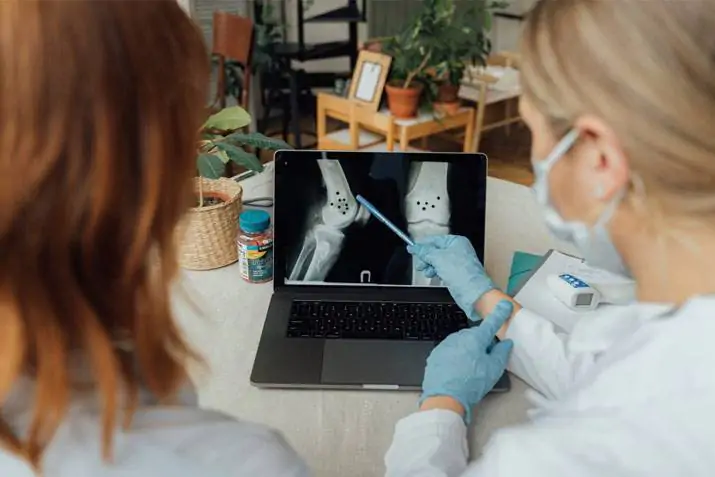Your bones are the foundation of your body, yet most people don’t think about bone health until something goes wrong. Osteoporosis quietly weakens bones over time, making them brittle and prone to fractures. The good news? You can take action today to strengthen your bones and avoid the risks later in life. In this guide, we’ll explore expert-backed strategies, lifestyle habits, and simple daily choices that can help you prevent osteoporosis naturally and keep your skeleton strong for decades.
Osteoporosis Overview: How It Affects Your Bones
Osteoporosis develops when there is a reduction in bone mass, resulting in thinner bones with a higher propensity to break. It can happen at any age, and both men and women are at risk. While some bone loss is natural with aging, the right diet, movement, and care can delay or even prevent it entirely.
Osteoporosis symptoms vary from person to person because the health conditions are constantly changing. No wonder the health experts call it a silent disease. The individual does not notice or feel the symptoms that may be signaling osteoporosis.
However, the most common symptom is the breaking of bones from a minor fall or a small accident. The symptoms gradually appear over time because the bones are losing their density. Notice the following instances.
Reduction in height by an inch or more
Rapidly changing natural posture
Excessive shortness of breath because the spinal disks are pushing against the lungs
Lower back pain because of a weak lumbar spine
Osteoporosis patients may not recognize changes in their body, but loved ones often do, sometimes through jokes about “shrinking.” If that’s happening to you, see a doctor right away.
Solutions for How to Prevent Osteoporosis
Make sure you follow these tips to prevent osteoporosis.
1 – Take calcium, vitamin D, and vitamin K2 supplements
Supplements containing calcium, Vit D, and high In potassium can help prevent osteoporosis. These three nutrients are essential for bone health but are not the only ones you need to worry about.
- Calcium: The recommended daily amount of calcium is 1000 mg per day for people over 50, 600 mg per day for those between ages 19-50, and 400 mg per day for those under 19. If you don’t get enough calcium in your diet or if there’s a problem with absorption (such as lactose intolerance), supplementing with 5000 mg of elemental calcium twice daily is recommended by most doctors. Strong bones are created by calcium, which helps avoid osteoporosis throughout life. Osteoporosis is a condition that can develop later in life in those who do not consume sufficient calcium or vitamin D.
- Vitamin D3: Most Americans get about 400 IU (international units) of vitamin D from their diet each day through foods like dairy products and fish oil supplements; however, some people may need more than this amount because they’re at risk for developing nutritional deficiencies such as rickets caused by low levels in UVB exposure during childhood. It’s also important that pregnant women receive 600 IUs per day starting at week 6 when their fetus gets sufficient sunlight exposure. Also, don’t forget to consume cloves.
2 – Eat more calcium-rich foods, like fortified dairy and kale
An important vitamin that supports strong bones is calcium. It’s important for building and maintaining healthy teeth, muscles, and nerves.
Several meals contain calcium, including dark-green leafy greens like:
- kale
- broccoli
- collard greens
- fish like salmon or sardines
- dairy products like milk (1 cup has about 300 mg)
- yogurt (one cup contains about 300 mg)
- soybeans (soy milk has about 90 mg per cup)
If you’re not getting enough calcium through your diet alone, try taking supplements daily if possible. And use one that contains 1000-1200mg per tablet/caplet, which should last two months at least!
3 – Exercise Regularly
A good way to prevent osteoporosis is by getting more exercise regularly. You can find one-minute workouts on YouTube if you don’t have time to exercise. It’s important to be physically active. Exercise can help you feel better, lose weight and sleep better.
Exercise has been shown to increase bone density in postmenopausal women by about 2% per year after five years of regular exercise. In addition to preventing osteoporosis, regular exercise also helps reduce your risk for other health problems, such as high blood pressure and heart disease.
4 – Avoid alcohol, limit caffeine, and don’t smoke
The following way-of-life decisions can aid in osteoporosis prevention:
- Limit caffeine, stay away from alcohol, and never smoke. Because alcohol is a stimulant, it can increase the amount of calcium lost through the urine and cause bone loss. Coffee reduces the body’s ability to absorb calcium from food sources and may also lower bone mineral density (BMD). Smoking increases the risk of osteoporosis in men because it causes bone loss through reduced bone formation and increased bone resorption.
- Insufficient vitamin D can cause osteoporosis. It would be best to have vitamin D for proper immune system functioning. And therefore for healthy bones. Because it helps regulate how much calcium your body absorbs from food into bones at each mealtime with its key role as an activator for calcitriol production by our kidneys.
- Consume vegetables to be more on track with your health.
5 – See your physician about possible aiding drugs
Your doctor can help you choose a medication that can help prevent osteoporosis. Some medicines are used for other health conditions, but they also have been shown to reduce your risk of fractures, falls, heart disease, and diabetes.
- Antibiotics: These drugs work by reducing inflammation in the body. They’re often prescribed after surgery or when an infection in your joints (like arthritis). If you have osteoporosis and are taking an antibiotic regularly for another reason (such as a urinary tract infection), talk with your doctor about whether this might affect the effectiveness of the treatment for bone loss.
- Beta-blockers: This type of blood pressure medicine works by lowering blood pressure overall, reducing risk factors associated with osteoporosis.
- Calcium supplements: The best way to get enough calcium into your bones is through food sources such as milk products; however, if these aren’t available, calcium supplements can help provide extra support while building up new ones over time.
You can prevent osteoporosis by making a few changes in how you live
You can prevent osteoporosis by making a few changes in how you live. You should:
- Consume calcium and other bone-healthy nutrients as part of a balanced diet.
- Exercise regularly (at least 30 minutes daily).
- Avoid alcohol, cigarettes, and caffeine, which can lead to weaker bones.
Avoid bad mental health days and talk to your doctor about medications that may help with osteoporosis prevention if they are medically necessary.
Conclusion
Osteoporosis is a weakening of bones that occurs as most people grow older. The primary cause of osteoporosis is loss of calcium from the body, and loss of height, weight, muscle mass, and physical activity may also contribute to osteoporosis.
We hope this post has assisted you in determining the types of lifestyle modifications that will aid in osteoporosis prevention. Therefore, it is very important to keep your bone density healthy, so you can maintain good posture and avoid the risk of osteoporosis.
Final Expert Tip:
Start early, the best time to build bone strength is in your 20s and 30s, but it’s never too late to begin. Even small lifestyle changes today can drastically lower your risk of fractures and improve mobility later in life.
FAQs About Osteoporosis
What are the symptoms of osteoporosis?
Osteoporosis often shows no symptoms until a fracture occurs. Common signs include back pain, loss of height, a stooped posture, and bones that break easily from minor falls.
What causes osteoporosis?
It’s mainly caused by loss of bone density with age. Other factors include low calcium or vitamin D intake, hormonal changes, smoking, alcohol use, and a sedentary lifestyle.
How to increase bone density?
Eat foods rich in calcium, vitamin D, and magnesium, exercise regularly (especially weight-bearing workouts), and avoid smoking or excessive caffeine. Supplements can also help if prescribed by a doctor.
Does osteoporosis cause pain?
Yes, it can. While bone loss itself doesn’t hurt, fractures—especially in the spine or hips—can cause long-term or sudden pain.
Do men get osteoporosis?
Yes. Although it’s more common in women, men can also develop osteoporosis, particularly after age 50 or if they have low testosterone, poor diet, or limited physical activity.
What foods are good for osteoporosis?
Calcium-rich foods like milk, yogurt, cheese, kale, broccoli, almonds, and salmon are great choices. Vitamin D-fortified foods also help your body absorb calcium better.
How to prevent bone loss?
Stay active, maintain a balanced diet rich in bone-supporting nutrients, avoid smoking and heavy drinking, and get regular bone density check-ups.
What exercises are good for osteoporosis?
Weight-bearing and resistance exercises such as brisk walking, dancing, stair climbing, and light weight training strengthen bones and improve balance.
What exercises should be avoided with osteoporosis?
Avoid high-impact workouts, heavy lifting, or bending and twisting movements like sit-ups or toe touches, as they may increase fracture risk.
Is walking good for osteoporosis?
Yes! Walking is one of the best low-impact exercises for maintaining bone strength and improving posture and balance.


